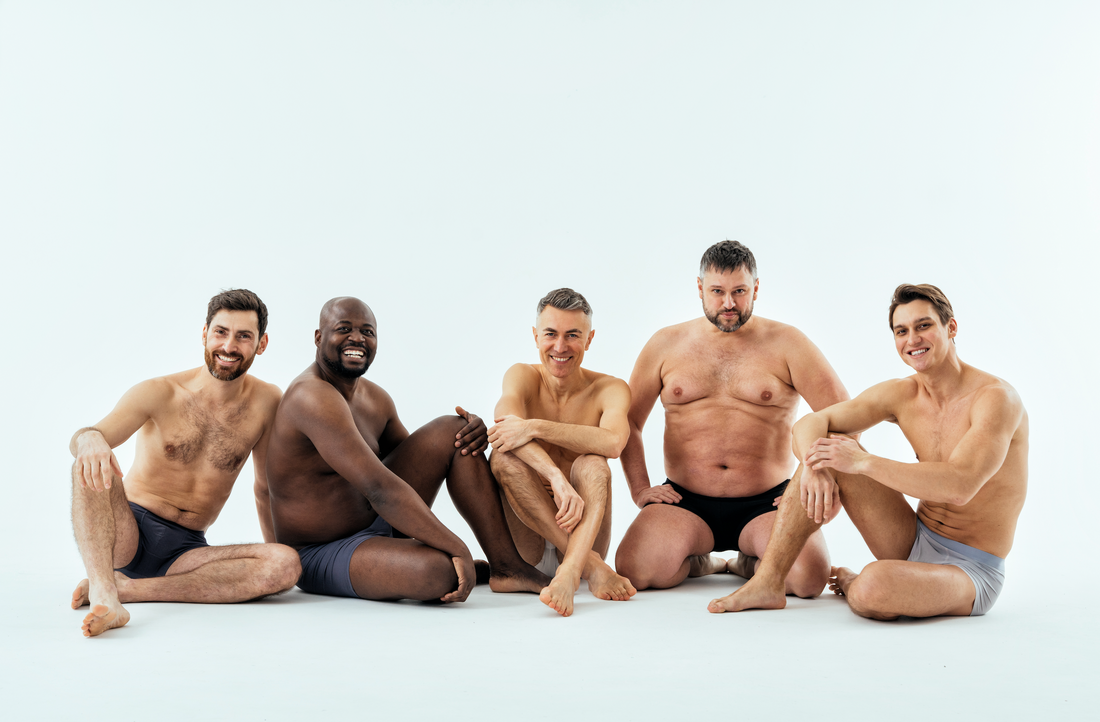
Men and Body Image in a Changing World
Share
The conversation is shifting when it comes to men and body image, bringing into focus the complex relationship between men and their bodies. In recent years, societal norms surrounding masculinity have undergone significant transformations, prompting men to confront traditional ideals and redefine their perceptions of self-image. From the pressure to achieve muscularity to the stigma surrounding mental health and how men feel about their bodies.
One prominent aspect of the male body image narrative revolves around muscularity.
Historically, the idealized male physique has been characterized by strength and muscularity, perpetuated by media representations of chiseled Hollywood actors and professional athletes.
This ideal places immense pressure on men to conform to unrealistic standards, leading to body dissatisfaction and unhealthy behaviors such as excessive exercise or steroid use.
The rise of social media has further exacerbated this phenomenon, with platforms like Instagram showcasing perfectly sculpted bodies that can foster feelings of inadequacy and comparison among men.
The pressure to conform to traditional masculine ideals can have detrimental effects on men's mental health. The expectation for men to be stoic and unemotional often prevents them from seeking help for mental health issues such as depression, anxiety, and eating disorders.
This pressure can lead to feelings of isolation and shame, exacerbating existing body image concerns.
Men of diverse backgrounds face unique challenges and experiences when it comes to body image. Cultural and racial stereotypes can shape perceptions of masculinity and beauty, influencing how men perceive themselves and are perceived by others.
Additionally, LGBTQ+ men may grapple with body image issues related to societal expectations of attractiveness within their communities. Recognizing and addressing these pressures is essential in promoting body acceptance for all men.
Fortunately, there is a growing movement to challenge traditional notions of masculinity and promote body positivity among men.
By challenging societal norms, promoting mental health awareness, and embracing diversity, we can foster a culture of acceptance and self-love for all men, regardless of their body type or identity. It's time to redefine masculinity and create a more inclusive and compassionate world for everyone.
Here are 6 ways to help you feel better about your body if your one that struggle with this common insecurity.
-
Practice Self-Compassion: Instead of focusing on perceived flaws or comparing oneself to unrealistic standards, practice self-compassion. Treat yourself with kindness and understanding, acknowledging that everyone has insecurities and imperfections. Practice positive self-talk and challenge negative thoughts about your body.
-
Focus on Health, Not Just Appearance: Shift the focus from achieving a certain aesthetic to prioritizing overall health and well-being. Engage in activities that make you feel strong, energized, and fulfilled, such as regular exercise, nutritious eating, and getting enough sleep. Remember that health looks different for everyone, and it's essential to find what works best for you.
-
Surround Yourself with Supportive People: Surround yourself with friends, family, and communities that uplift and support you. Surrounding yourself with positive influences can help boost self-esteem and remind you that you are valued for who you are, not just how you look.
-
Limit Exposure to Negative Media: Be mindful of the media you consume and its impact on your self-image. Limit exposure to media that perpetuates unrealistic beauty standards or promotes unhealthy comparisons. Instead, seek out body-positive content and representations of diverse bodies that celebrate authenticity and inclusivity.
-
Practice Mindfulness and Body Acceptance: Engage in mindfulness practices such as meditation, yoga, or deep breathing exercises to cultivate awareness and acceptance of your body. Focus on the present moment and appreciate your body for all that it allows you to do, rather than fixating on its perceived flaws.
-
Seek Professional Support if Needed: If body image concerns are significantly impacting your well-being or mental health, consider seeking support from a therapist or counselor. Therapy can provide a safe space to explore underlying issues, develop coping strategies, and cultivate a more positive relationship with your body.
By incorporating these practices into your daily life, you can cultivate a healthier and more positive relationship with your body, leading to increased self-confidence and overall well-being. Remember that feeling good about your body is a journey, and it's okay to seek support along the way.
